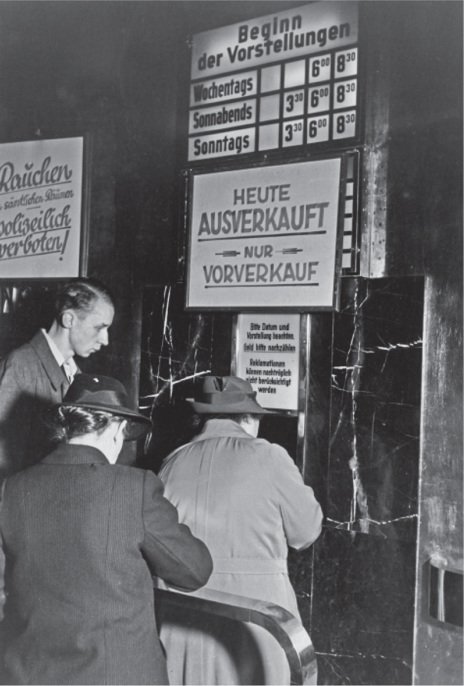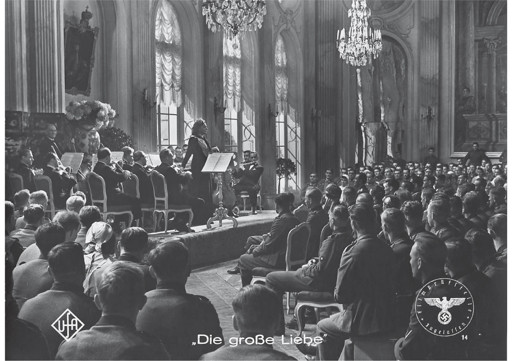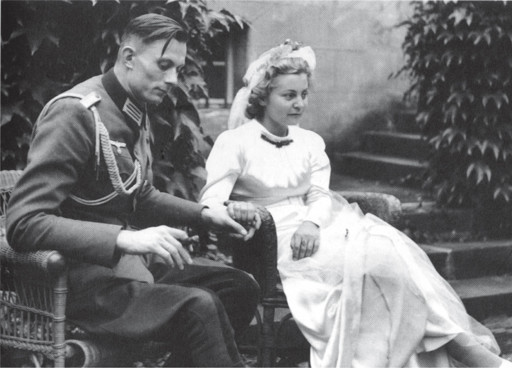The German War (60 page)
Authors: Nicholas Stargardt

Liselotte Purper: off-duty anti-aircraft personnel playing duets in the bunker of the Anhalter Bahnhof, Berlin.

Queuing for cinema tickets, Berlin.

Zarah Leander singing ‘The world isn’t going to end because of this’ in
The Great Love
(1942).
The Great Love
(1942).

War wedding: Liselotte Purper and Kurt Orgel, September 1943.
Fritz M., by contrast, fared less well. In May 1943, the Gestapo arrested him for sending out forty-six letters to families of men listed on Radio Moscow to tell them that ‘the allegedly missing German soldiers are in captivity and doing well’. This counted as ‘Communist propaganda’ because it challenged the ‘common assumption . . . that German soldiers in Russian captivity were treated badly’. Fritz M. was also a former member of the Social Democratic Party. Given that these were potential capital offences, he was relatively lucky to be sentenced to two years in prison, a sure sign that the police did not yet want to push such cases to the extreme. He obviously did not consider his own actions to be a form of clandestine resistance: whereas some letter-writers signed themselves off as ‘+++’, ‘a national comrade’ or ‘+++ (unfortunately I can’t do otherwise)’, he had provided his name and address. It was also revealing that not a single one of the recipients had denounced him, a fact that they also had to explain to the Gestapo.
77
77
Despite all efforts to intercept letters and postcards from German prisoners of war in Soviet captivity, a few of them got through, some via addresses in neutral countries, some through administrative incompetence. In April 1943, the censorship office in Vienna let a letter slip through to Gisela Heitz, the wife of a senior officer in the 6th Army, General Walter Heitz. The contents of the letter were soon doing the rounds of other senior officers’ families, some of whom, like Gisela Heitz herself, included the Wehrmacht High Command in their correspondence as they tried to discover how they could establish contact with their loved ones. The Wehrmacht Information Office did its best to dampen down expectations, explaining that ‘due to the completely negative attitude of the Soviet Union, there have been no agreements whatsoever regarding contact with German prisoners of war in the Soviet Union’. The Heitz story soon grew into the myth that this tough-minded general served as a liaison person for the missing and prisoners in the east. The rumours persisted into the summer of 1944, revived rather than buried under the impact of new battles and defeats on the eastern front. The Army High Command finally took the highly unusual step of officially denying them.
78
78
After months of waiting for news, Luise Stieber’s only comfort was her diary conversations with her missing husband, and the poems she wrote to him at night:
I sit in the room so alone
In the night by the lamp’s light
Nearby in the bed our child
Calls your name in his sleep.
. . .
When I feel about to give up,
Then I take down your picture,
Call both children to me
And see them weep for you.
Then I know in all sorrow
They are a comfort to me.
So, I want to stand by my post,
Brave and not giving up,
For I know for sure
The day is coming
When we will meet again.
79
Some historians have suggested that such irretrievable loss was the overriding collective experience of the Second World War in Germany, and that it alienated many from the regime. Yet it is hard to read either defeatism or political resistance into such reactions. It was a private grief, and in early February 1944 Luise Stieber still insisted, ‘So, I want to stand by my post, / Brave and not giving up’. She consoled herself also with words Zarah Leander had sung in
The Great Love
: ‘I know there’ll be a miracle one day’. Twelve days later she confessed to her husband in her diary, ‘Without a greeting, without a word from you, everything is unspeakably hard. I feel like an orphan.’ Momentarily forgetting her two children, she added, ‘Now I have no one any more who belongs to me.’
80
The Great Love
: ‘I know there’ll be a miracle one day’. Twelve days later she confessed to her husband in her diary, ‘Without a greeting, without a word from you, everything is unspeakably hard. I feel like an orphan.’ Momentarily forgetting her two children, she added, ‘Now I have no one any more who belongs to me.’
80
Searching for an outlet after three months of fruitless, nervous waiting, at the start of April 1943 Hildegard Probst picked up the present her children had given her for Christmas, a bound notebook, and began to write to her husband. ‘I want to turn it into a kind of diary,’ she explained, ‘to replace the letters which I can no longer write to you. I want to tell you in it what I would have otherwise written in my letters and so it ought to be a kind of bridge to the time when you are with us again. Because I still firmly believe that you will return one day.’ She tried to relay the most important news items from the medieval town of Mühlhausen in Thuringia. Shops and businesses were closed as part of Goebbels’s ‘total war’ drive, and she reported on the war deaths, some marked merely by newspaper notices, others by a ‘very moving’ funeral which brought the community together, complete with a detachment of soldiers who fired a volley over the empty coffin. For the families of the missing, there could be no such closure.
81
81
But time did not stop. Their three children, Hildegard wrote at Whitsun, ‘are able to live out the day unburdened and know nothing of my grief. And if they do occasionally see my tears, then they want to comfort me, that Daddy is going to come back again.’ Their eldest son, Karl-Heinz, was taking on the kind of responsibility his father had always feared he would shirk, and applied for an apprenticeship at the Junker works in Dessau. A month later, in mid-July, Hildegard was amazed still to be receiving letters back which she had written to her husband before Christmas 1942. On Fritz’s birthday, 17 August, she decorated his photo with roses as usual and thought enviously of the families of the men from the Afrika Korps: they had all received mail from the 250,000 men who had surrendered to the Americans in Tunisia back in May.
82
82
Many other wives and mothers carried on with their lives like Hildegard, sending their children to school, writing to the families of other men listed as missing, sometimes passing on chain letters themselves. The birthdays and anniversaries of weddings, call-up and last leave rolled by; the small gifts and photos sent home from the front remained in prominent view. While his cabinetmaker’s tools gathered dust in the workshop, Hildegard Probst was not alone in feeling she could only reach her missing husband by keeping a diary for him. Theirs was grief without mourning. Without public recognition, communal consolation and widows’ pensions, they remained in limbo.
PART FIVE
THE WAR COMES HOME
11
Bombing and Retaliation
On 15 February 1943, a ceremony took place for the first time which gave a new dimension to Germany’s mobilisation for war. The 15- and 16-year-old boys enrolled in classes 6 and 7 in the higher schools were sworn in as air force and naval auxiliaries. As they shed their Hitler Youth uniforms for the real thing and swore their military oaths of allegiance to the Führer, many were ecstatic. It was, one Cologne schoolboy wrote, ‘a momentous day’, which filled him ‘with a feeling of pride, for I know that I too can take part in the defence of the homeland’. Among these first two cohorts were Hans-Dietrich Genscher from Reideburg in Saxony, who would later become German Foreign Minister, the future novelist Günter Grass from Danzig and the seminarian Joseph Ratzinger from Traunstein in Bavaria, the future Pope Benedict XVI. So many boys served with the anti-aircraft batteries, or the flak as it was universally called, that the whole levy is often refered to as the
Flakhelfer
generation, although in fact it chiefly involved the Gymnasium-educated middle classes. By the end of the war, the 1929 and 1930 cohorts had also served, including the future social theorist Jürgen Habermas and future Chancellor Helmut Kohl. The enrolment was the first of a series of adjustments to civil defence, which would indeed make Germans’ experience of war ‘total’.
1
Flakhelfer
generation, although in fact it chiefly involved the Gymnasium-educated middle classes. By the end of the war, the 1929 and 1930 cohorts had also served, including the future social theorist Jürgen Habermas and future Chancellor Helmut Kohl. The enrolment was the first of a series of adjustments to civil defence, which would indeed make Germans’ experience of war ‘total’.
1
In Hamburg, 16-year-old Klaus Seidel, the son of a schoolteacher, joined the anti-aircraft battery in the middle of the city park. In Berlin Hans Joachim M. and the rest of his class were sent to man positions on an airfield. While the boys rejoiced in their new-found freedom and responsibility, their parents complained about lack of access and home visits. The press reassured them that they need not worry that their sons would be forced to take on tasks beyond their strength, while also reminding the boys that they were relatively privileged compared to those doing industrial apprenticeships. Alongside military training under Luftwaffe and naval personnel and ideological instruction by the Hitler Youth, the teenagers were supposed to continue their schooling, with a streamlined timetable. After attending a parents’ evening at the Gymnasium in Cologne-Mülheim, one father was furious: ‘Personally I find the whole thing outrageous,’ he wrote to his elder son serving at the front. ‘Hundreds and thousands of strong young men like my colleague P. are running around and avoiding service. And instead, they’re taking children just out of their nappies.’ The older son disagreed: even if you avoid ‘all emotionalism’, he admonished his father, it remained the case that ‘not only the sons nowadays have to do their duty by becoming soldiers, but so do the parents too, namely by letting them go where they are needed, with their unconditional support and in the spirit of unconditional fulfilment of their duty’.
2
2
Hans Joachim M. and his Berlin classmates went to assist the elderly reservists and Russian auxiliaries in servicing the huge searchlights and radar controls which supported the flak artillery. On the Führer’s birthday, 20 April, Hans Joachim’s battery was hit: a soldier was killed but none of his group. In the next battery the boys were not so lucky: seven of them were killed that day. In Essen, Rolf Dieter Koch saw action even sooner. At 8.45 p.m. on 5 March, the air raid sirens began to wail. At precisely 9 p.m. the first Mosquito fighter bomber dropped its red markers over the Krupp works on the southern side of the city. At short intervals until 9.36 p.m., 7 Mosquitoes, 17 Lancasters and 5 Halifax heavy bombers went on marking the site, adding an inner ring of green flares to the red outer ring. Flying in close formation, 89 Halifax bombers, 52 Stirlings, 131 Wellingtons and, last of all, 140 Lancasters arrived in three waves over the city. By 9.40 p.m., they had dropped 524.4 tonnes of incendiaries and 490.4 tonnes of high explosive and were heading home. By the end of that night, Rolf Dieter Koch was too exhausted to do more than jot down his experiences in telegraphic style: ‘Strong force of oncoming planes. First deployment at the map table. High explosive and fire bombs in the position. Re-evaluation destroyed. Our barracks burned down. Putting out fires. Sleep.’ The bombs killed 457 people and wounded a further 1,400; 50,000 people lost their homes that night, with 3,016 houses totally destroyed and 2,050 severely damaged. A week later the bombers returned, killing another 648 people and making a further 40,000 homeless. For days afterwards, Carola Reissner, who had mocked the RAF’s efforts in 1940, was still hearing the detonation of bombs from the raid.
3
3
Other books
Kingdom of Darkness by Andy McDermott
A Grave Magic: The Shadow Sorceress Book One by Sheehan, Bilinda
Jesus by James Martin
Testing Fate by Belinda Boring
Waiting for Sunrise by Eva Marie Everson
The Nuclear Catastrophe (a fiction novel of survival) by Billig, Barbara C. Griffin, Pohnka, Bett
A Mate for the Savage by Jenika Snow
Her Spy to Hold (Spy Games Book 2) by Paula Altenburg
Touch of Fire by Samantha Sommersby